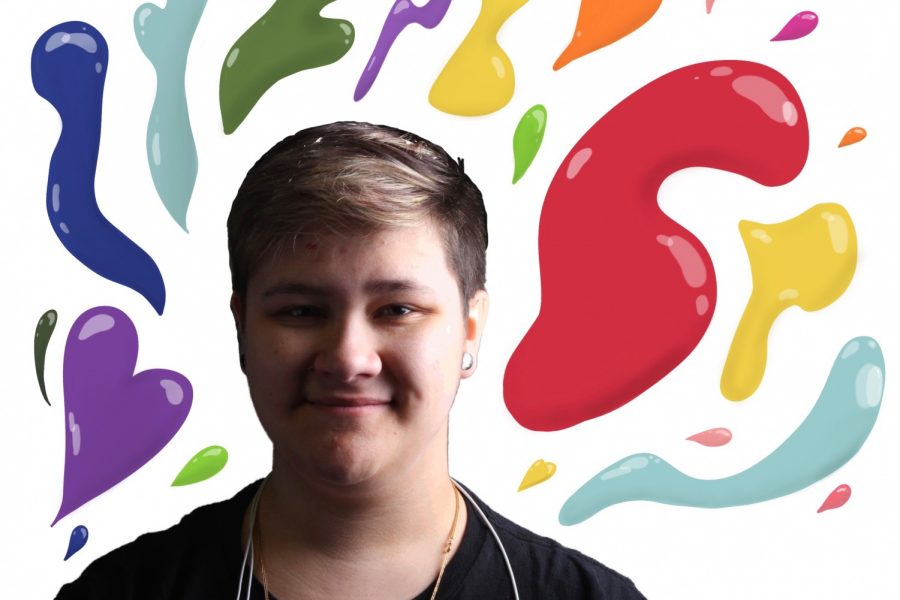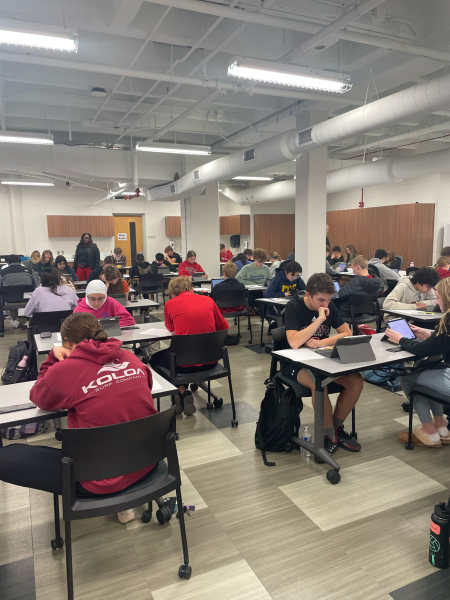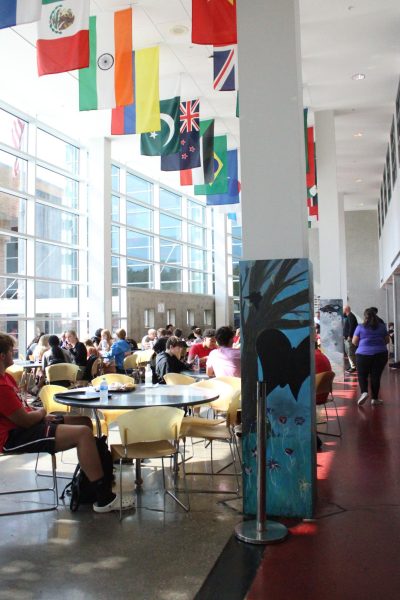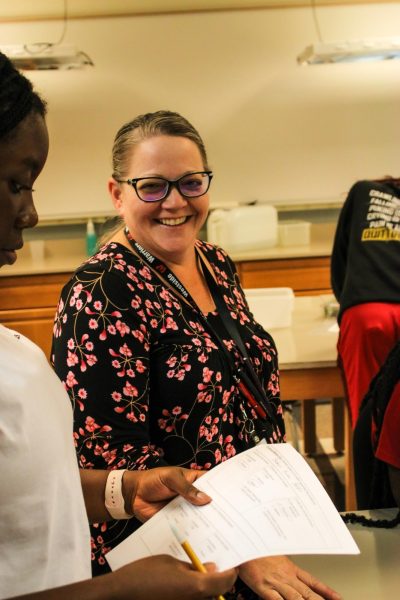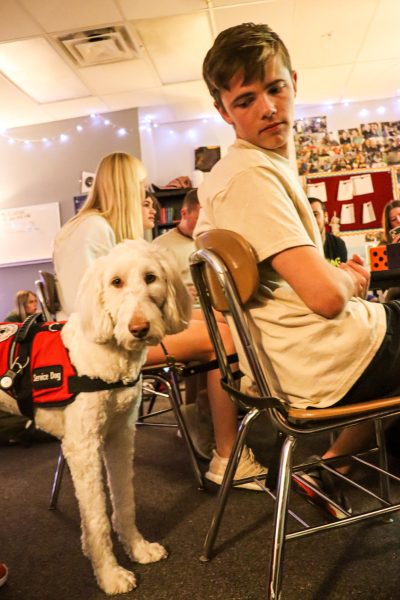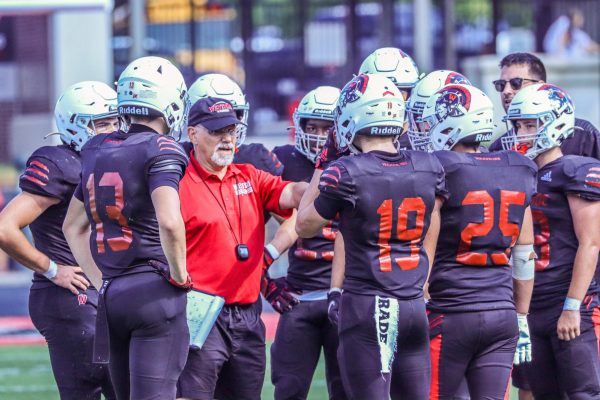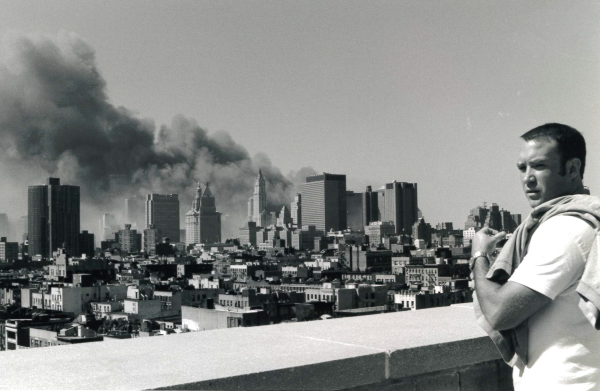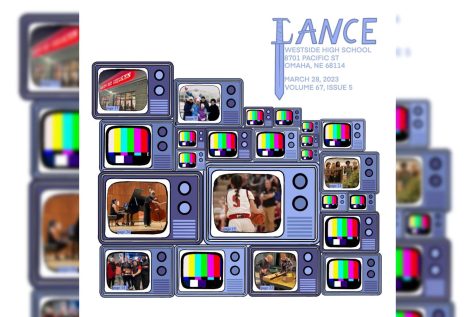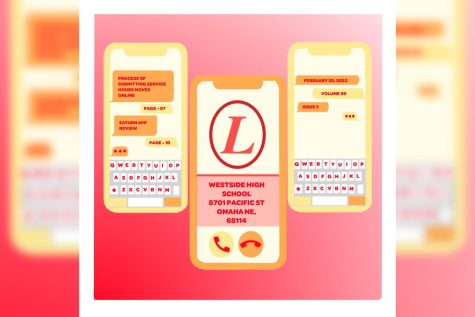Out and Open
Senior Zarfieh Patterson discusses his experience coming out as a transgender male
Senior Zarifeh Patterson is a self-proclaimed “open book.”
“A lot of people have asked me ‘When did you know you were transgender?’ and I found that my story is almost identical to every other trans man’s story which is kind of scary,” Patterson said.
Patterson said he started experiencing gender dysphoria, the condition of feeling one’s emotional and psychological identity as male or female to be opposite to one’s biological sex, when he was 13 years old. As a child, he said he looked feminine. He had hair down to his waist. His mother would dress him in pink, a color he’d come to dislike.
“As soon as he could talk he’d say ‘I hate pink, I hate pink, I hate pink,’” Zarifeh’s mother, Sana Amoura said.
Amoura said he was a pretty rough and tumble child, but that she didn’t initially think he was transgender.
“I think my first cue that he might be transgender was like in middle school,” Amoura said. “You know when most kids turn like 13, 15, the girls tend to start to dressing nicer, taking care of their hair and stuff, and I could not get Zarifeh to do that.”
Patterson said he was unsure of his identity at the time.
“I didn’t really like using she/her pronouns, I didn’t feel like I identified with that,” Patterson said. “At the time, I didn’t really feel like I identified with he/him either. I just kind of closed myself off in a box. I would never wash my hair and neglected my body; which I found is very common in a lot of trans men and trans women’s stories.”
This neglect was one of the cues to Patterson’s mom that he might be transgender.
“I realized, this is a signal to keep people away, when you don’t do self-care like that,” Amoura said. “He didn’t want attention about sex or gender.”
Patterson grew up in Waterloo, Nebraska and went to a small school that would have had a graduating class of about 40 people. The family moved to Omaha in 2015 and Patterson began his freshman year at Westside. According to Patterson and his mother, this was what allowed Zarifeh to come out.
“The second [we moved],” Amoura said, “Zarifeh had a whole bigger arena to be in. Because I think in that small town, there was just no way.”
Zarifeh explained that with a larger setting, it was easier for him to find people to identify with.
“At least Westside’s big enough,” Zarifeh said. “If you always cast out that huge net you’ll at least find one person to relate to. So, Westside has that. There’s always going to be people who you can be friends with; there are always going to be people who can support you here.”
This new environment allowed Zarifeh to further explore his gender identity.
“I started looking into it,” Patterson said. “I talked to a therapist, and eventually when I came to high school, I was 14, I started identifying as bigender.”
Patterson explained a bigender person is someone who either identifies as both male or female, or someone who is trying to figure out where they fall on the gender spectrum. Identifying this way, Patterson said, helped him figure out who he was.
“At the time, I was like I’m okay with she/her or he/him or they/them,” Patterson said. “But then, as I progressed through my freshman year about halfway through my sophomore year I really preferred he/him. The more people that would say that I just realized I preferred that. So, I took another step in that direction.”
Patterson has received many questions from people figuring out their own gender identity.
“I have a lot of trans friends … a lot of them have asked me, ‘What do you do if you think you’re trans,’” Patterson said. “I’ve gotten a lot of anonymous texts saying ‘What do I do?’”
Patterson jokingly added that a lot of people know him as somewhat of a “transgender ambassador.” When people reach out to him, he advises taking small steps.
“I always say if you think you think you might be somewhere on the spectrum, you should take a step in one direction and see if it works,” Patterson said. “I’m not talking about doing hormones and getting surgery. That’s very last call things.”
According to Patterson, some steps a trans man could take in figuring out his identity is wearing a binder, which conceals breasts, or a packer, a prosthetic penis. Patterson advised to do what makes you feel better, and if it doesn’t work, stop. Patterson used to wear a binder, and began hormones and surgery this year.
“It took me four years to do that,” Patterson said. “I just had top surgery now, and I’ve just started testosterone.”
Will Patterson, Zarifeh Patterson’s brother, said he is supportive of his transition and has expressed similar ideas of taking small steps.
“What I tried to express to him was that it’s okay to just even feel like you’re testing something out,” Will Patterson said.
Zarifeh said he’s lucky; his experience was relatively easy in comparison to other trans people’s stories. He attributes this to his mother, who said that even before Zarifeh came out, she had exposure to transgender people and issues. Amoura is a teacher at Metro Community College, so she had had transgender students. Zarifeh’s aunt, Jean Amoura, is a doctor who runs a transgender clinic at UNMC. So, when Sana Amoura’s son came out, she didn’t see it as a negative thing.
“Being different in some way has been a gift to Zarifeh,” Amoura said. “I don’t see it as some horrible tragedy. I see it as ‘Wow you get to see the world through a different lens? What a beautiful thing.’”
This is not to say that Zarifeh’s Patterson coming out didn’t worry his family. Will Patterson, while overwhelmingly supportive, said he realized Zarifeh would encounter a lot of adversity as a trans person.
“I looked at Zarifeh being transgender and thought ‘It is crazy, things just got more difficult for him,’” Will Patterson said.
These difficulties were what Amoura said Zarifeh’s dad feared.
“I did struggle with my dad, like most trans men do,” Zarifeh Patterson said. “They usually struggle with their father if they have a father. Or they struggle with their male role model in their life. And I really struggled with my dad. But most people do, and they get through it, and that’s it.”
Zarifeh Patterson said he understands his father’s feelings are fear based.
“[My dad] fears for my safety above all else,” Zarifeh Patterson said.
Amoura said her ex-husband was afraid of the risk Zarifeh Patterson would be at as a trans person, but she believes confidence will protect him.
“If you are confident and you go forward in this way and are proactive, and you’re out there, then people aren’t going to mistreat you,” Amoura said.
It has taken time, but Zarifeh Patterson’s mother said she believes her ex-husband is becoming more accepting.
“I think by now he’s kind of come around to it, but it just took him a while,” Amoura said. “I don’t think that’s a reflection on how he feels about Zarifeh; I think that’s just his own comfort level.”
Despite this being a difficult change for the family, Will Patterson said all of this has beneficial.
“I think Zarifeh coming out, Zarifeh being incredibly patient with family members, really changed our family for the better…” Patterson said. “I would say it made all of us more aware of gender identities and of this fantastic community. It’s helped us. In many ways, it’s helped us all.”
Both Amoura and Will Patterson credit Zarifeh Patterson for being an open person. Will Patterson stressed the importance of discussing gender.
“I literally don’t know a trans person who isn’t willing to have dialogue about gender and explain how they feel and explain their identity,” Will Patterson said. “I’m not say trans people are obligated to have that conversation, I’m just saying you’d be impressed by how many trans people are really able to articulate gender identity in a really succinct and beautiful way that I think a lot of cis people never consider.”
And Zarifeh Patterson is one of those people, always willing to have a conversation.
“He’s the most open-minded person I know,” Will Patterson said. “The guy will listen to anything. He’ll hear anyone out at least once.”
Zarifeh Patterson’s willingness to learn is evident in his passion for school. He said he loves school—learning, teaching—anything to do with education.
“My favorite things in the world are languages and culture,” Zarifeh Patterson said. “I love them, love them, love them. So, I want to learn Japanese and Arabic.”
Zarifeh Patterson’s grandfather is from Palestine, and Arabic is his family’s native language.
“That’s why I’m so interested in languages…because of my family,” Zarifeh Patterson said. “I consider myself bicultural at the very least. I’ve always been interested in understanding cultures that I don’t have around me.”
French Instructor Anne Johnson has had Zarifeh Patterson as a student for about two years and said his interests are evident in the classroom.
“[Zarifeh] has always been a very engaged student in the classroom, very passionate about language, always super curious about whether it’s culture or history or grammar, he just wants to know more, more, more,” Johnson said. “I’m going to miss him. He was a great guy to have and an awesome student.”
Zarifeh Patterson has pursued language classes outside of Westside, too. He’s taken Japanese courses at Metro Community College. While he debated between learning Japanese, Mandarin, Korean and Cantonese, he chose Japanese because of his gender.
“I ultimately landed on Japanese because they are the most LGBT friendly,” Zarifeh Patterson said. “Not that [the other countries] are homophobic in the slightest. Those countries aren’t; there are huge waves of advocacy going through them, but Japan just seems like the furthest along. That just seemed like the safest place for me to go if I wanted to go there. So, that’s ultimately why I chose it.”
According to Zarifeh Patterson, safety is always a concern.
“I think sometimes people forget that like sometimes being transgender can really put a restriction on your life in the sense of it is dangerous to go some places,” Zarifeh Patterson said.
While Zarifeh Patterson said sometimes he feels limited because of his gender identity, his mother said she thinks it helps him see life with a broader view.
“I think [his love of music and language] may be partly born out of being different in some ways,” Sana Amoura said. “When you’re not the majority, in any capacity, you start to see the world through a different lens.”
Zarifeh Patterson expresses himself through art, language and music. To many, this is inspiring.
“To see Zarifeh so eagerly and so confidently grasp something like another language or an instrument is breathtaking,” Will Patterson said. “It’s completely alien to me and it’s beautiful to watch it and it really gives me absolute confidence that as long as he has that passion and that desire, he absolutely is the kind of person who is going to find his niche, and he absolutely is going to do something great with it. I’ve never doubted that for a second.”
Your donation will support the student journalists of Omaha Westside High School. Your contribution will allow us to purchase equipment and cover our annual website hosting costs.
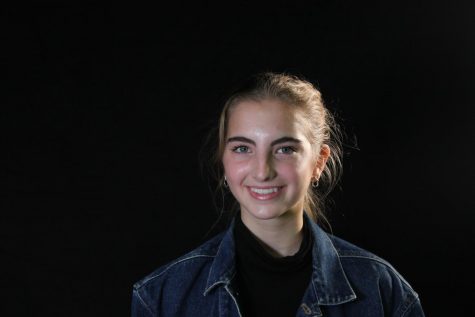
Hi my name is Julia Steiner! I am an Editor-In Chief for Lance this year. I am currently a senior and this is my fourth year on Lance. If you have any...


